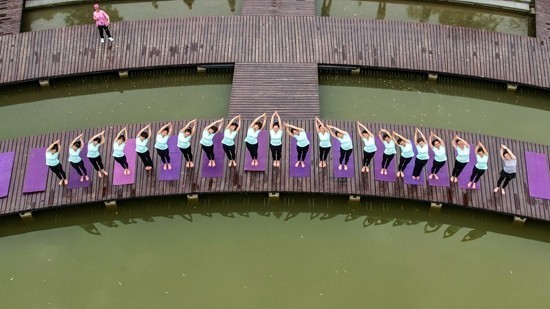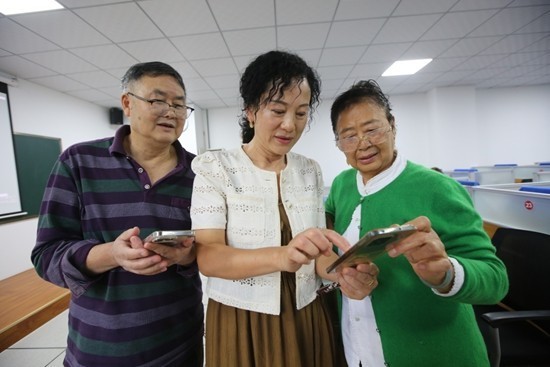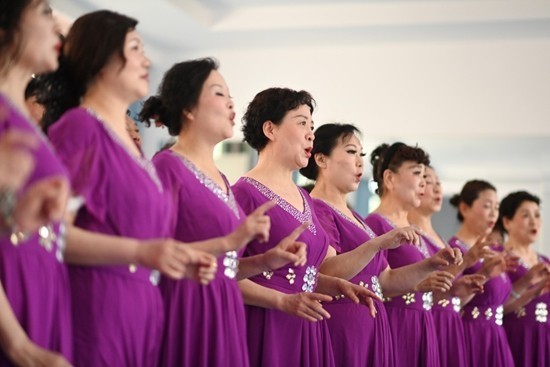 On 1 June 2022, in Xiangyang City, Hubei Province, students from a seniors' university yoga class were rehearsing in the park.
On 1 June 2022, in Xiangyang City, Hubei Province, students from a seniors' university yoga class were rehearsing in the park.

On 16 October 2023, in Meishan City, Sichuan Province, an instructor at a seniors' university was teaching a class on "Smartphone Applications," helping elderly students learn how to use smartphones.

On 28 March 2024, at the Tianxingqiao Sub-district Elderly University in Shapingba District, Chongqing Municipality, seniors were attending a choir class.

As summer arrives, the rising temperatures bring an increase in buzz around school admissions. Schools at various levels are continuously releasing enrolment brochures, holding admissions consultations, organising campus open days, and issuing admission notices.
At the same time, many elderly universities across various regions are holding graduation ceremonies and launching new semester enrolment efforts. They are showcasing their educational philosophies, management features, campus culture development, spirit of teachers and students, and class teaching outcomes through online promotions and offline visits.
Just like young students, the "silver-haired" population now enjoys more conveniences and opportunities to access quality educational resources.
According to data from the National Bureau of Statistics, the population aged 60 and above in China exceeded 296 million by the end of 2023, accounting for 21.1% of the total population. It is estimated that the elderly population will surpass 400 million by around 2035, making up more than 30% of the total population.
Population ageing has become a fundamental national condition in China in the 21st century. As this process accelerates, both the government and society continue to support the livelihood, well-being, and family support of the elderly. As a key measure to enhance the spiritual life of the elderly and improve their quality of life, elderly education has garnered strong policy support. In 2021, the Central Committee of the Communist Party of China (CPC) and the State Council issued a guideline titled "Measures to Step Up Efforts to Tackle Population Ageing in the New Era." This guideline proposed incorporating elderly education into the lifelong education system, promoting the expansion of elderly education resources, establishing a national elderly university based on the Open University of China (OUC), and building a national platform for sharing elderly education resources and public services.
The "Opinions on Developing the Silver Economy to Enhance the Well-being of the Elderly" is the country's first specialised document supporting the development of the silver economy. Issued by the State Council in 2024, it is also the first of its kind for that year. It outlines plans to enrich cultural and sports services for the elderly, establish a national elderly university, and promote open education to the public. Additionally, the document highlights the creation of a national elderly education public service platform and the formation of a resource and faculty pool for elderly education, anchored by the national elderly university.
In July 2024, the Resolution of the Central Committee of the Communist Party of China on Further Deepening Reform Comprehensively to Advance Chinese Modernisation (hereinafter referred to as the Resolution) emphasised refining policies and mechanisms for developing elderly care programmes and industries. The Resolution also proposed advancing the digitalisation of education to support the creation of a learning society and provide enhanced support for lifelong education.
Meanwhile, local education departments in various regions are working collaboratively with the bureaus of retired veteran cadres, organisational departments at various levels of the CPC committees, civil affairs systems, universities for the elderly, relevant associations, foundations, social enterprises, and other entities to proactively address the growing educational needs of the elderly population.
Embracing “learning” while growing old has become a new trend.
High Demand and Popular Classes
Chen Cheng, a staff member at the Fujian Branch of the Seniors University of China (SUC) and the Open University of Fujian for the Aged, told a reporter that the university has opened enrolment for the new semester. Courses in nearly 40 classes across 15 majors were quickly snapped up. The most popular courses, such as Ba Duan Jin (Eight Sections Brocade, a type of health Qigong) and vocal music, filled up in less than a minute.
In mid-June, the SUC's Shanghai Branch and the Shanghai University for the Elderly hosted a campus open day and a kickoff event for the 2024 autumn enrolment. The event was vibrant, featuring a variety of cultural performances organised by various mass organisations and departments, as well as skill demonstrations by students in calligraphy, painting, floral arrangements, and pastry making. Elderly friends from across the city attended to observe live teaching and sample the courses they were interested in.
In the cities of central and western China, enrolment at universities for the elderly is also "in high demand." Ding Jian, a 66-year-old student in the recitation class at SUC's Gansu Branch and Gansu Open University for the Elderly, vividly recalls his first enrolment experience. He arrived at the university at 7 a.m. and found the hall crowded with people. "Some had arrived at the site around 4 a.m., taking the initiative to write numbers and organise the queue."
With limited availability for in-person classes, online courses have become a "second-best" option. Following her daughter's recommendation, 52-year-old Zhang Ying (a pseudonym) explored the National Education Platform for the Elderly. "There are live classes, specialised courses, and more. Whenever I have free time, I select the classes that interest me," Zhang Ying said.
In small towns and vast rural areas, the elderly population shares a strong desire for learning. The reporter observed that in Fujian, many rural communities have established "Leling School" (Happy E-learning for the Aged), where teachers and volunteers from the SUC’s Fujian Branch and the Open University of Fujian for the Aged "bring classes to their doorstep."
In Yuku Village, Gutian County, classes now start at 8 a.m., but many people are already waiting by around 7 a.m. The elderly wear red uniforms provided by the school and carry schoolbags, gathering together excitedly. They not only learn new knowledge but also enjoy sharing it with their family members.
“The elderly have bid farewell to their previously monotonous and idle lives, now living with more anticipation and fulfilment; meanwhile, young people who have gone out to work and start businesses feel more at ease.” According to village officials in Yuku Village, the establishment of the Leling School has reconnected the community, with villagers showing greater support for government initiatives and contributing to the development of local industries.
As a pioneer in elderly education, the SUC was officially inaugurated in March 2023. In just over a year, the university established 42 provincial branches based on the Open University system and created over 55,000 elderly learning points at the community level. By partnering with bureaus of retired veteran cadres, universities, and the China Association for Non-Government Education, the university has progressively extended its educational services to communities, serving a total of 22.14 million elderly learners across the system. Additionally, it has provided learning support services to more than 76.68 million individuals through the National Education Platform for the Elderly.
This data highlights the rapid growth of the SUC and indirectly confirms the strong demand for learning among the "silver-haired" population.
Enjoy Learning and Experiencing “Transcendence”
What are the reasons for going to university?
In an interview, a student at an elderly university who is learning to play the Bayan accordion told a reporter that she became "fascinated" with the instrument after hearing it played over 30 years ago. However, she initially prioritised her children's musical education due to family commitments. Now, she has the opportunity to pursue her own dream and cherishes it even more.
After retiring, I spent my days at home caring for my ageing parents. Wanting to inject some energy into my life, I decided to engage in more dynamic activities. That's why, at 70, I chose to become a 'new learner.' I enrolled in a short video production course at the SUC’s Gansu Branch and Gansu Open University for the Elderly. My goal was to explore cutting-edge knowledge and expand my horizons by using the camera to capture life stories in my later years.
"Although I am open to enjoying solitude, it's also important to engage with life. This is another reason why many seniors choose to return to the classroom," Ding Jian explained. He noted that as people age, staying home can lead to social isolation, which accelerates ageing. However, by integrating into a group and interacting with others in areas of interest and expertise, he finds new directions and gains motivation to move forward.
Many of Ding Jian’s classmates have expressed similar sentiments: "We aren’t very old yet, and we still have plenty of energy. We want to stay connected with society and younger people to keep our minds young."
"Elderly universities help us find like-minded circles and make our lives more fulfilling," said Ding Jian. Because of passion, we come together; because of passion, we learn; because of passion, we communicate; and because of passion, we will go on.
Many elderly learners seek to use their education not only for personal pleasure and health but also to contribute to their families and society. Zhang Ying, for instance, focuses on a module called "Proactive Health" in her online courses. This module covers topics such as family care, health care through traditional Chinese medicine, medication safety, and food nutrition. She regularly shares her insights and knowledge in the family group chat.
"Learning is a spiritual need for individuals, and lifelong education is a fundamental right that empowers social participation," said Zhang Xiangyu, director of the Study Centre at the Senior College of SUC. Through interactions with elderly learners, she has heard their voices and become more convinced of this viewpoint.
Zhang Xiangyu stated that in today's digital era, all facets of life—including daily activities, medical needs, and transportation—are deeply intertwined with digital technology. A primary objective of universities for the elderly is to boost seniors' digital literacy, equipping them with the necessary skills to thrive in the digital age through structured teaching and learning.
"The need for transcendence is a very prominent and unique demand in old age," stated Zhang Xiangyu. As people grow older, they increasingly face physical decline and become acutely aware of life's finiteness, which can lead to feelings of frustration and fear. However, acquiring new knowledge can offer a sense of transcendence and relief.
Integrating Resources and Stimulating Vitality
Educational institutions are aligning with the expectations of the elderly by integrating social resources, stimulating social vitality, and advancing the modernisation of education for the elderly.
Zhu Yaoyin, a professor at the China Institute of Education and Social Development at Beijing Normal University and vice president of the China Association of Social Welfare and Senior Service, stated that developing education for the elderly is crucial for achieving comprehensive elderly care, medical services, and personal fulfilment, learning, and happiness for older adults. He emphasised that it is an effective way to nurture seniors who are accomplished, progressive, and happy in the new era. Currently, the quality of elderly education services in China has significantly improved, with major advancements in meeting the learning needs of the elderly. This progress is particularly evident in the diversification of educational providers, the establishment of collaborative mechanisms, the variety of learning methods, the digitalisation of teaching methods, and the standardisation of service management.
Taking the SUC as an example, the university promotes a five-in-one educational system that includes "branches, sub-schools, mutual contribution units, directly-affiliated campuses, and research bases." It has implemented a series of initiatives such as improving course resource quality, building and promoting platforms, developing teaching staff, and enhancing credit bank services.
The university has organised, compiled, and optimised a total of 437,000 course resources, totaling 4.22 million minutes. It has established the School of Proactive Health and developed a Proactive Health curriculum system. It has published a series of 39 books titled "Nutrition and Elderly Diet." Additionally, it has independently developed a total of 130 types of board games and toys under the "Smart Ageing Games" brand, and created 35 types of elderly education cultural and creative products, such as "Intangible Cultural Heritage Handicrafts." These efforts integrate educational content into various educational product formats.
Ensuring Happiness and Accomplishment for Older Adults
Elderly individuals are both recipients and active participants in education. By enrolling in courses, they update their perspectives and enhance their abilities, while also applying their initiative, activity, and creativity to create additional value.
In the cheongsam course at the SUC’s Fujian Branch and Open University of Fujian for the Aged, 64-year-old Shi Hua, dressed in a black practice outfit, holds an embroidered fan and a green scarf, gracefully following the teacher.
Fan Yuqing, who resides in an international community in Xiamen, has been studying English at the Elderly University for 10 years. She aims to showcase her own experiences, help foreigners understand China, and change the stereotypical image of "Chinese aunties."
In addition to studying short video production at school, Zhao Yingxin, a "new learner," has also taught herself family education guidance to help young people address issues they encounter in their careers and families.
Embracing “learning” as a way to support elderly care has generated happiness and accomplishment for older adults.
Source: China Youth Daily, 5 August 2024